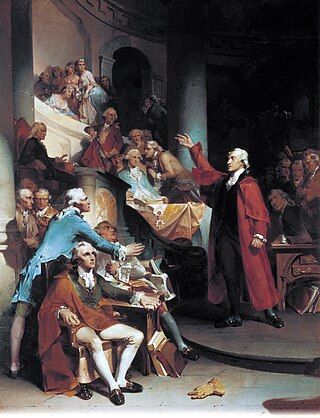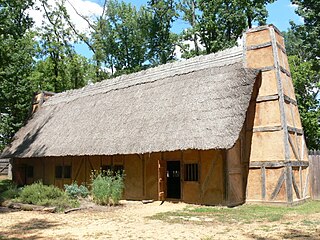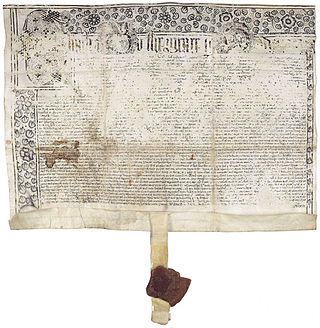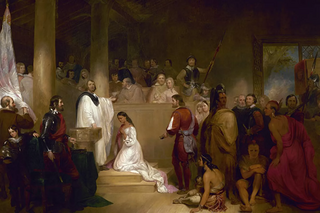
The Jamestown settlement in the Colony of Virginia was the first permanent English settlement in the Americas. It was located on the northeast bank of the James River, about 2.5 mi (4 km) southwest of the center of modern Williamsburg. It was established by the Virginia Company of London as "James Fort" on May 4, 1607 O.S., and was considered permanent after a brief abandonment in 1610. It followed several failed attempts, including the Lost Colony of Roanoke, established in 1585 on Roanoke Island, later part of North Carolina. Jamestown served as the colonial capital from 1616 until 1699. Despite the dispatch of more settlers and supplies, more than 80 percent of the colonists died in 1609–1610, mostly from starvation and disease. In mid-1610, the survivors abandoned Jamestown, though they returned after meeting a resupply convoy in the James River.

The Colony of Virginia was an English, later British, colonial settlement in North America between 1606 and 1776.

The House of Burgesses was the elected representative element of the Virginia General Assembly, the legislative body of the Colony of Virginia.

The Virginia General Assembly is the legislative body of the Commonwealth of Virginia, the oldest continuous law-making body in the Western Hemisphere, the first elected legislative assembly in the New World and was established on July 30, 1619.
Sir George Yeardley was a planter and colonial governor of the colony of Virginia. He was also among the first slaveowners in Colonial America. A survivor of the Virginia Company of London's ill-fated Third Supply Mission, whose flagship, the Sea Venture, was shipwrecked on Bermuda for ten months from 1609 to 1610, he is best remembered for presiding over the initial session of the first representative legislative body in Virginia in 1619. With representatives from throughout the settled portion of the colony, the group became known as the House of Burgesses. It has met continuously since, and is known in modern times as the Virginia General Assembly. Yeardley died in 1627.

The Virginia House of Delegates is one of the two houses of the Virginia General Assembly, the other being the Senate of Virginia. It has 100 members elected for terms of two years; unlike most states, these elections take place during odd-numbered years. The House is presided over by the Speaker of the House, who is elected from among the House membership by the Delegates. The Speaker is usually a member of the majority party and, as Speaker, becomes the most powerful member of the House. The House shares legislative power with the Senate, the upper house of the General Assembly. The House of Delegates is the modern-day successor to the colonial House of Burgesses, which first met at Jamestown in 1619. The House is divided into Democratic and Republican caucuses. In addition to the Speaker, there is a majority leader, majority whip, majority caucus chair, minority leader, minority whip, minority caucus chair, and the chairs of the several committees of the House.

The "Citie of Henricus"—also known as Henricopolis, Henrico Town or Henrico—was a settlement in Virginia founded by Sir Thomas Dale in 1611 as an alternative to the swampy and dangerous area around the original English settlement at Jamestown, Virginia. It was named for Henry, Prince of Wales (1594–1612), the eldest son of King James I.
Francis West was a Deputy Governor of the Colony and Dominion of Virginia.

Historic Jamestown is the cultural heritage site that was the location of the 1607 James Fort and the later 17th-century town of Jamestown in America. It is located on Jamestown Island, on the James River at Jamestown, Virginia and operated as a partnership between Preservation Virginia and the U.S. National Park Service as part of Colonial National Historical Park.

Sir Francis Wyatt (1588–1644) was an English nobleman, knight, politician, and government official. He was the first English royal governor of Virginia. He sailed for America on 1 August 1621 on board the George. He became governor shortly after his arrival in October, taking with him the first written constitution for an English colony. Also sailing with him on this voyage was his second cousin Henry Fleete Sr., who helped found colonies in both Virginia and Maryland. In 1622 he rallied the defence of Jamestown which was attacked by Native Americans, during which the lives of some 400 settlers were lost and he then oversaw the contraction of the colony from scattered outposts into a defensive core.
Lt. John Gibbs was an American settler and member of the Virginia House of Burgesses.
Thomas Graves was one of the original Adventurers (stockholders) of the Virginia Company of London, and one of the very early Planters (settlers) who founded Jamestown, Virginia, the first permanent English settlement in North America. He was also the first known person named Graves in North America. Captain Thomas Graves is listed as one of the original Adventurers as "Thomas Grave" on page 364, Records of the Virginia Company of London, vol. IV.
John Potts was a physician and Colonial Governor of Virginia at the Jamestown settlement in the Virginia Colony in the early 17th century.
Smith's Hundred or Smythe's Hundred was a colonial English settlement in the Province of Virginia, in the modern United States of America. It was one of the original James River plantations named after the treasurer of the Virginia Company, Sir Thomas Smythe. It was settled by the English in 1617 and after 1620, was known as Southampton Hundred in honor of the Earl of Southampton. The site was originally home to a village of the Paspahegh Indians. They were located along the north bank of James River.
Walter Chiles was a British merchant who emigrated to the Colony of Virginia where in addition to his business interests, he became a prominent planter, military officer and politician who at times represented Charles City County and James City County in the House of Burgesses, as well as briefly served on the Virginia Governor's Council and as Speaker of the House of Burgesses until removed by Governor WIlliam Berkeley because of a conflict of interest in ongoing litigation.

Jamestown, also Jamestowne, was the first settlement of the Virginia Colony, founded in 1607, and served as the capital of Virginia until 1699, when the seat of government was moved to Williamsburg. This article covers the history of the fort and town at Jamestown proper, as well as colony-wide trends resulting from and affecting the town during the time period in which it was the colonial capital of Virginia.
Temperance Flowerdew, Lady Yeardley was an early settler of the Jamestown Colony and a key member of the Flowerdew family, significant participants in the history of Jamestown. Temperance Flowerdew was wife of two Governors of Virginia, sister of another early colonist, aunt to a representative at the first General Assembly and "cousin-german" to the Secretary to the Colony.

Reverend Richard Buck was a minister to the Colony of Virginia at Jamestown, Virginia from 1610 to 1624. He was chaplain of the first session of the Virginia General Assembly, which was composed of the House of Burgesses and the Virginia Governor's Council. This assembly met in the church at Jamestown on July 30, 1619, as the first elected assembly and law making body in colonial America.
Samuel Sharpe, sometimes referred to as Samuel Sharp was an early Virginia colonist who settled in the area that became Charles City County, Virginia. He came to Virginia in 1610 with most of the passengers and crew of the Sea Venture as they made their way to the colony after 10 months in Bermuda. They had wrecked in a storm there and built two small boats to complete their journey to Jamestown. Along with Samuel Jordan, he represented Charles City as a burgess in the first general assembly of the Virginia House of Burgesses in Jamestown, Virginia in 1619. He was a representative for Westover, an incorporation of Charles City, in the 1623/24 assembly and signed a letter along with several burgesses at the time of that assembly.
William Sharpe was an early Virginia colonist, soldier, ancient planter, and Virginia Company shareholder who settled in the Bermuda Hundred area that became part of Charles City County, Virginia. He served in the Virginia House of Burgesses in Jamestown, Virginia, in 1629.








